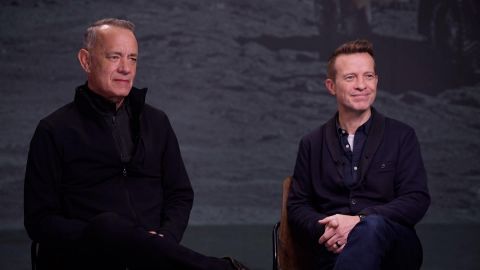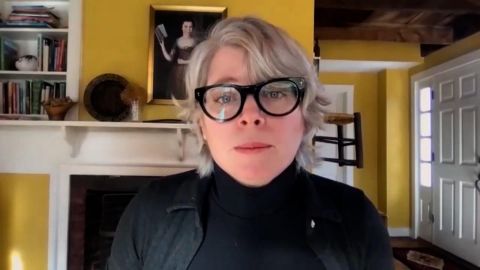Read Transcript EXPAND
CHRISTIANE AMANPOUR, CHIEF INTERNATIONAL ANCHOR: It is called “Moonwalkers” and it’s narrated and co-written by Tom Hanks, who’s a long-time space enthusiast, alongside the writer- director Christopher Riley. Here’s a taste of the experience.
(BEGIN VIDEO CLIP)
TOM HANKS, CO-WRITER AND NARRATOR, “MOONWALKERS”: In the 50,000 years of human history, just 12 of us have traveled from our Earth to walk on another celestial body.
UNIDENTIFIED MALE: Forty seconds away from the Apollo 11 liftoff. Five, four, three, two, one, liftoff. We have a liftoff. Lift on Apollo 11.
HANKS: Now, join me on a journey back to the moon, in a remarkable immersive show at Lightroom.
(END VIDEO CLIP)
AMANPOUR: So, just days ahead of today’s opening to the public here in London, I asked them what inspired this project now?
(BEGIN VIDEO CLIP)
AMANPOUR: Tom Hanks, Chris Riley, welcome to the program.
HANKS: Good to see you.
AMANPOUR: This is a quintessentially American story. So, why is it debuting in London, space, and Apollo and Artemis? What made you think of London?
HANKS: This very facility that we’re sitting in now in King’s Cross is the most — it is the most unique immersive venue I’ve ever come across in my life. The first time we came here we see an exhibit of David Hockney paintings. Now, I thought I was going to be seeing an exhibit of David Hockney paintings. I didn’t realize I was going to be walking into one of his paintings as David himself was painting it all around you. Seeing that that was possible, I immediately went to the powers that be, Richard Slade (ph), and everybody else, said, you know, you could put people in the Taurus-Littrow Valley, where we are sitting right now on Apollo 17, and it would be as though we were sitting right on the moon. Have you guys thought about that? And they said, no, but would you like to think about it with us? And so, here we are. The uniqueness of this space, I could not quite fathom the — it’s not virtual reality, Christiane, it’s reality. It’s not a headset with earphones on. You are literally in a 360 — well, you don’t have a roof on us, but below you and all around you is the environment that you want to create, and it just so happens to be the vacuum of space and The Sea of Tranquility.
AMANPOUR: And the two of you wrote this together. What did it take to write this? What were you trying to achieve? What was it about the moon, the story that’s been told so many times?
HANKS: That’s a good question. Why?
CHRISTOPHER RILEY, CO-WRITER AND DIRECTOR, “MOONWALKERS”: Well, yes. I mean, it’s not entirely about the moon. The story is actually a story of hope, of course. It’s about hope, of humanity, of what we can do when we work together. Apollo really epitomizes that. It was the work of half a million people for a decade, all pulling together for one particular quest. And it was driven by curiosity in part. And when we are curious, we discover unexpected things. And that’s essentially the message we wanted to try and convey in part, isn’t it, Tom?
HANKS: You know, the interesting thing is why and why now. And I think that if you took the headlines of 1969, and the headlines of 2023, they actually match up in quite — what’s the word I’m looking for?
AMANPOUR: Synchronicity.
HANKS: Yes. And it’s not great news. It’s actually quite troublesome and it is very much sort of like defining of this era that we’re in right now. And at the same time in 1968, and same time in 2023, people were going to the moon. I mean, we do make a big deal about the Artemis missions that will be going back around the moon within the next year, which is an incredible step for humankind. For myself, when I was 13, the Apollo missions were this example of the — it was an evolutionary place in the consciousness of humankind, because the only reason to go to the moon was because we’re human beings and we desire to figure out what is on the other side of the hill, and that affected me very much then. And if we’re human beings, do we not have to remain curious, and do we not have to strive in order to see what is on the other side of that door?
AMANPOUR: And do we not have to be stirred? Because you say correctly that this unbelievable 360 experience puts you in the moment. And the opening words we’ve heard, and you have the opening narration.
(BEGIN VIDEO CLIP)
HANKS: Every human being who ever lived on the planet Earth looked up at the moon, and it’s given us our seasons, it’s given us our day, the length of our month, and we’ve been moved by it, you know, spiritually.
(END VIDEO CLIP)
AMANPOUR: How did you come up with, I mean, what’s really curiosity, human, you know, connection to your opening statement? How did that come out?
HANKS: If we are going to become interplanetary beings from “Star Trek” and all of the great wonderings of great science fiction, theoretical fiction now and in a lot of ways, we will be doing so based on what we learned as space faring beings when we went to Apollo. There’s only there’s only 12 human beings that have walked on the surface of another planet, only 12 of us in the 50,000 years of human behavior. When we do it again, and we will, we will be doing it because these were the pathfinders who showed that it was possible in the first place. It’s not just a matter of the technology, certainly that is, but it’s also as a question, as you yourself said, it’s wherewithal. Do we want to? And the answer is, yes, we do. So, then the how is, well, we already have kind of like a template of how, we just have to follow it through to whatever the next chapter is going to be.
About This Episode EXPAND
Israeli peace activist Robi Damelin whose son was killed in 2002 by a Palestinian sniper, discusses the need for an end to the cycle of violence in the region. Tom Hanks and Christopher Riley on their new documentary experience “Moonwalkers” about the Apollo space program. Journalist Jill Lepore explains what the trial of Jefferson Davis can teach us about the legal cases against Donald Trump.
LEARN MORE

